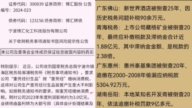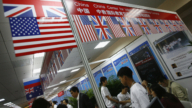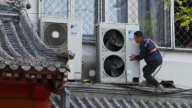【新唐人2011年12月24日訊】中國互聯網數據中心日前發佈《中國寬頻用戶調查》報告,調查顯示,2011年前三季度絕大部分互聯網用戶在使用「假寬頻」,上網平均速度達不到標定速度,但每月的費用卻是香港的469倍。中國電信業的問題再次成為社會各界關注的焦點。網民表示,在中國假貨太多了,利益壓過效率,屬於商業欺詐,同時也是國有資本壟斷導致的結果。
調查顯示,2011年前三季度中國固網寬頻與3G用戶數纍積達到1.5億與1.02億,但中國絕大部分互聯網用戶在使用「假寬頻」。
調查表明,超過半數用戶上網寬頻下載速率,低於運營商提供的名義寬頻速率。
數據顯示,使用4M寬頻的用戶中,應享有每秒512KB的網速,實際平均速度在每秒400KB以下的佔91.2%﹔使用2M寬頻,理論網速是每秒256KB,實際平均速度在每秒200KB以下的佔83.5%﹔使用1M寬頻,實際平均網速在每秒100KB以下的佔67.6%,與名義速度差異極大。
但報告還指出,寬頻費用方面,大陸固網寬頻用戶上網1M帶寬,每月費用實際折合13.13美元,是越南的3倍、美國的4倍、韓國的29倍、香港的469倍。
《六四天網》義工浦飛:「如果按照兩國人員的收入比來講,這個差距是非常驚人的。就是這個費用從占有日常收入的工資收入比來講,這個費用非常驚人。同時,由於中國的寬帶互聯網路是被國家所控制的國有控股公司來壟斷,長期以來,它的下載速度和上傳速度都達不了他們所承諾的要求。」
大陸網民菁菁:「就是打開網站的時候,特別是打開空間的時候,網速特別慢。現在說是3兆的,在公司裡的時候說是3兆的。3兆的但是我覺得跟家裏1兆的都一樣的,反正都挺慢的。」
對於收費方面,大陸網民菁菁表示,在那個環境裡沒有辦法,只能無奈的接受。
菁菁:「你就是再怎麼不滿意,它就是這麼規定的,咱也沒有辦法。主要它就是強行的,你要按幾兆的規定多少錢,650、700(人民幣),它就是這麼限制的,那只要你上網就得去交錢。」
上個月,中共喉舌報導了「中電信」和「中聯通」兩公司,涉嫌在寬頻接入領域存在壟斷。《南方都市報》社論表示,電信行業本身屬於國家特定行業和領域,採取限制其他主體進入的方式來特許經營,是最明顯也是最主要的國有資本壟斷行業之一。
所以,對於這次《中國寬頻用戶調查》公布的這個數據,《六四天網》義工浦飛認為,這些數據證明中國互聯網長期處於一種商業欺詐行為。
浦飛:「由於很多小區的佈線情況,很多小區完全達不到它所承諾的。技術設計,它也達不到它所承諾的那個帶寬。但是中國的互聯網的運營商,也依然向他們銷售這種高寬帶的服務。這是一個違背基本商業道德的行為。」
而《萬家網》評論說,中國每年產生的「電信欺詐性收費」現象數不勝數,整個社會對電信業的不滿日益加深,而能夠通過投訴或訴訟獲得返還的數額卻微乎其微。不知「霸王」條款何時能叫停?
新唐人記者唐睿、李若琳採訪報導。
China’s Broadband: Slower Speed with Sky High Costs
China’s Internet Data Center recently released a report on
" A survey of China’s Broadband Users".
The survey shows that in China, the vast majority of
internet users used unqualified broadband services in the first three quarters of 2011.
The actual broadband speed is lower than the nominal,
charges are 469 times higher than those in Hong Kong.
Problems with China’s telecomm monopoly have once again
become the focus of the public’s attention.
Chinese netizens say that China is full of fake commodities.
The telecomm sector places interests over efficiency,
its practice should be classified as commercial fraud,
this is the result of having state-owned monopolies.
The survey shows that in the first three quarters of 2011,
the number of Chinese users of fixed-line broadband and
3G wireless service reached 150 million and 102 million,
respectively.
However, the vast majority of them are using
“fake broadband” services.
The report reveals that over half of broadband users’ actual
download speed is slower than the operators’ nominal speed.
The nominal speed for 4M broadband users is claimed to be
512KB per second,
while in reality, 91.2% of the said users are offered
below-400KB service.
For 2M broadband with a nominal speed at 256KB per second,
83.5% of 2M broadband users were actually given below 200KB.
Of 1M broadband users, the percentage of below-100KB speed
accounts for 67.6%, with its nominal 128KB speed.
In terms of broadband charges, China’s users pay about
USD 13.13 for a monthly 1M broadband service.
The cost is three times that in Vietnam, four times that in the U.S.,
29 times that in South Korea and 469 times that in Hong Kong.
64tianwang.com volunteer Pu Fei says: “If calculated on the
basis of general income, the gap is strikingly wide.
Even the percentage of the broadband cost that accounts for
the Income is found to be staggering.
What’s more, China’s broadband business has been wholly
controlled by government-owned holding companies.
For a long time, the download and upload speeds have
fallen short of stated company commitments."
Chinese netizen Jingjing says: “Getting access to websites
is particularly slow, especially to the web space.
The speed is said to be 3M per second for the company user.
But I feel it’s just the same as the home service of 1M speed,
and , both speeds are quite slow."
As to the broadband charges, Jingjing says in that environment,
there are no other alternatives, so they have to accept it.
Jingjing says: “No matter how dissatisfied you are,
you have to follow their regulations and pay. You cannot do anything about it.
The charges are stipulated on the basis of the service you use.
As long as you use the internet, you have to pay. “
According to last month’s reports on CCP official medias,
both China Telecom and China Unicom are suspected of
monopoly in the broadband access business.
The Southern Metropolis Daily editorial said that
the telecom sector is a specific industry and field,
a franchise that restricts other entities’ access,
and is one of the most obvious and important sectors that is monopolized by state-owned capital.
Pu Fei thinks the survey’s data has proved that
Chinese broadband users have been subjected to long-term commercial fraud.
Pu Fei: “Lots of residential communities’ broadband services
are not qualified in terms of technology and facilities,
but China’s internet operators still sell such costly
high-bandwidth services. This violates basic business ethics."
The Wancame.com editorial says, that numerous cases of
fraudulent telecomm charges emerge annually in China.
The public’s discontent on the telecomm sector has
intensified increasingly, while hardly any refund can be obtained via complaint or litigation.
The citizens wonder, when will the no-trade clause disappear?
NTD reporters Tang Rui and Li Ruolin































